Contribution of bioscience to the green transition

A popular-science event open to the public was held in Zagreb, Croatia, on the topic of "Contribution of bioscience to the green transition". It was organized by the Croatian Society for Biochemistry and Molecular Biology (HDBMB) as part of its "Science and Society" program. The event was one of the winners of the call for proposals for ‘Science and Society’ Constituent Society events/activities, awarded by the FEBS Science and Society Committee.
The aim of this popular-science event was to demonstrate to the public how new scientific knowledge can be useful for the green transition. The topic is very relevant and important to the objectives of the European Commission within the framework of the “European Green Deal”. Also, the meeting was intended as a link and an introduction to the 47th FEBS Congress “Together in Bioscience for a Better Future”, which was held in Tours, France in July 2023, and where, among other things, new biotechnological solutions to some of the biggest challenges facing the world today were discussed.
To raise awareness of the importance of molecular biosciences to the green economy in Croatia, the meeting was open to the public and included lecturers from the University of Zagreb and panelists from the Ministry of Economy and Sustainable Development of the Republic of Croatia and the private sector. The meeting was funded by the Federation of European Biochemical Societies (FEBS) and HDBMB. The event had considerable media coverage, being presented on TV and radio broadcasts, appearing in several leading newspapers, and being present on social networks.
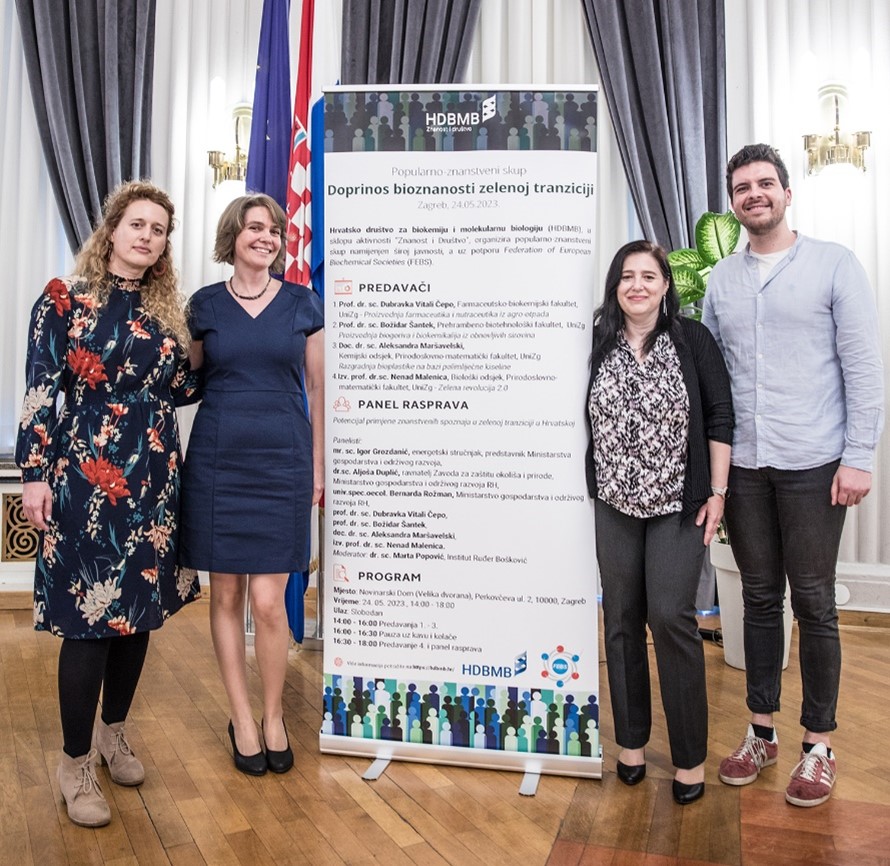
Four popular-science lectures focused on the production of useful biomolecules from agricultural waste, the production of biofuels and biochemicals from renewable resources, the development of new enzymes for the degradation of non-recyclable bioplastics, and the application of new genetic engineering technologies in agriculture. Each lecture was followed by an intensive ten-minute discussion with questions from the audience, giving the presenters an opportunity to engage in dialogue with the participants. Since this was an open event, we do not have precise information about the number and structure of the audience. The organizers estimated the number of participants at 70, covering a wide age range, from students to retirees.
Biomolecules from agricultural waste
Prof. Dubravka Vitali Čepo from the Faculty of Pharmacy and Biochemistry, University of Zagreb presented her latest research, in which she has developed methods for extracting valuable biomolecules from olive and tomato pomace and mandarin peel. New data point to the richness and diversity of bioactive components of agricultural waste (e.g., polyphenols, pigments, glucosinolates, dietary fibre), which have great potential for use in the food and pharmaceutical industries. To promote the reuse of agricultural waste in this context, it is necessary to develop environmentally friendly and efficient processes for the extraction of biomolecules, focusing on methods with high technological maturity; to develop high-quality formulations with defined composition and satisfactory functional properties for specific applications in the food and pharmaceutical industries; and to develop and implement a relevant, science-based methodology to evaluate the overall environmental footprint of newly developed processes. From the questions of the audience we learned that Prof. Vitali Čepo collects olive pomace from Dalmatia and Istria, that a small amount is needed to optimize the extraction process (< 1 kg), and that end products are dietary supplements which can be "shelf ready", as they are biomolecules that have already been approved by state authorities for food and medicine and are safe for consumption. These are, for example, capsules with high concentrations of compounds that are normally found in lower quantities in olive oil.
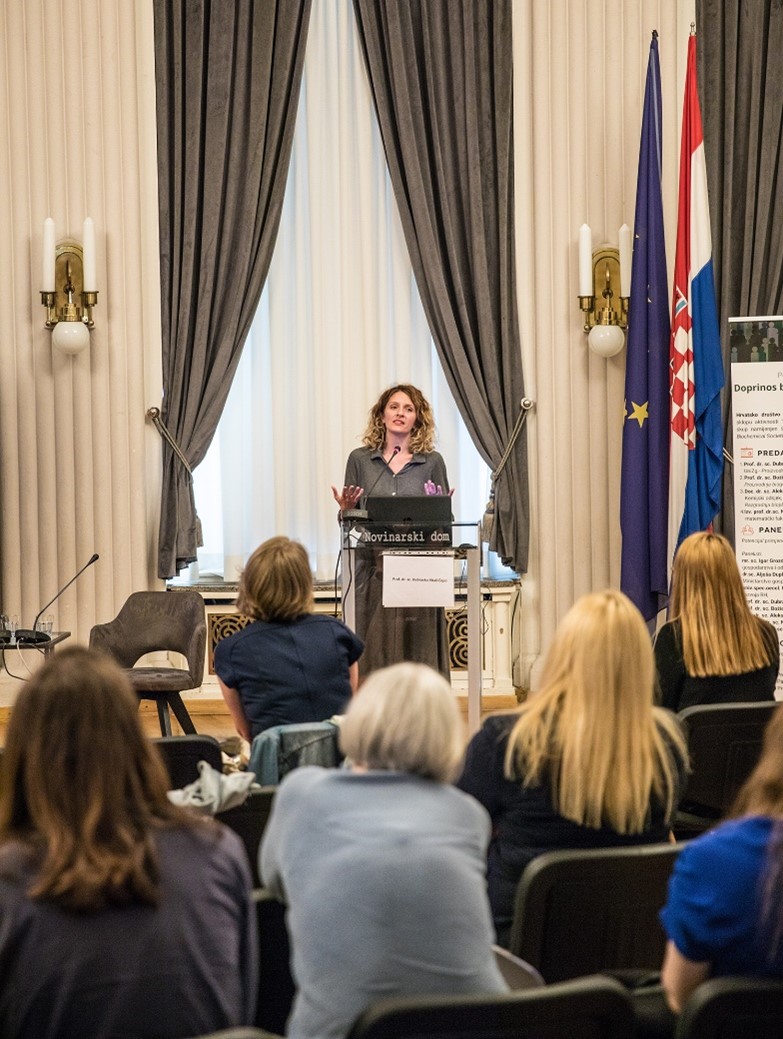
''Sustainable production of pharmaceuticals and nutraceuticals from agricultural waste"
Biofuels and biochemicals from renewable resources
After the discussion on the utilization of agricultural waste, we moved on to the topic of renewable energy sources. Prof. Božidar Šantek from the Faculty of Food and Biotechnology at the University of Zagreb gave an overview of the production process of biofuels (bioethanol, biogas and biodiesel) and biochemicals from renewable resources in the world and in Croatia. He pointed out that the production of biofuels and biochemicals from renewable sources is not yet economically sustainable compared to production from fossil fuels if there is no incentive system for their production and use. The production of bioethanol is economically sustainable if cheap and readily available raw materials or by-products from processing renewable raw materials are used for its production. For example, molasses or sugar beet pulp from the production of table sugar can be used in the sugar factory to produce bioethanol, so that the costs of transporting the raw materials can be neglected.
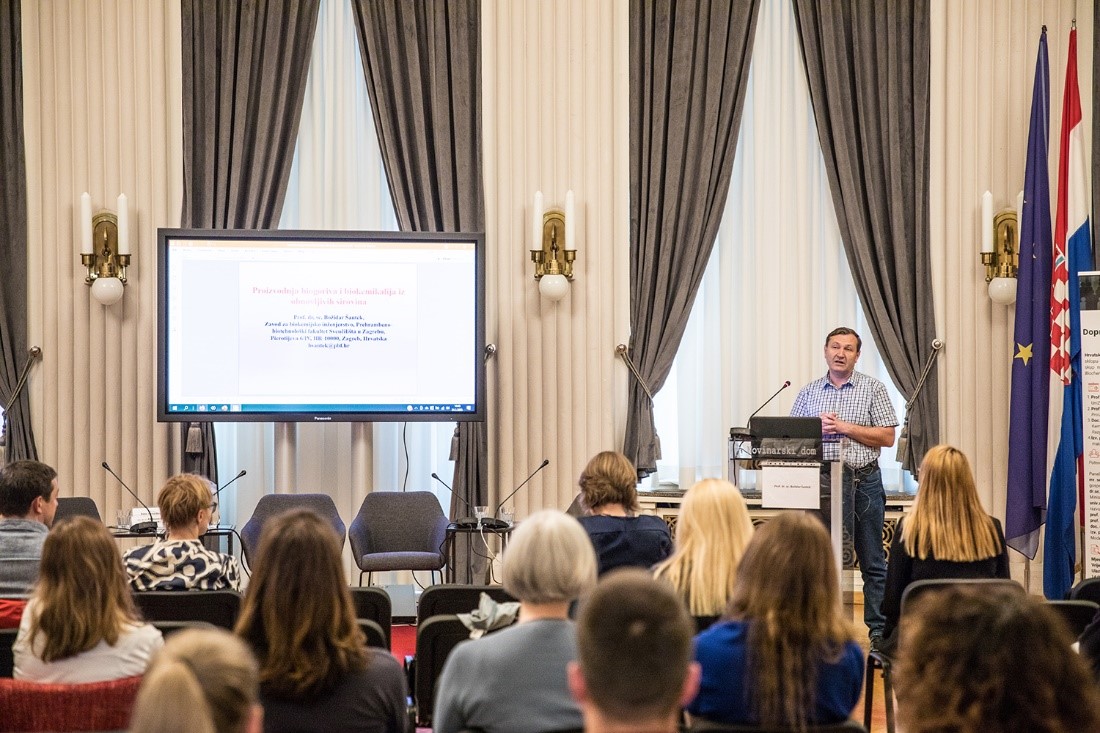
''Production of biofuels and biochemicals from renewable resources"
New enzymes for the degradation of non-recyclable bioplastics
Asst. Prof. Aleksandra Maršavelski from the Department of Chemistry, Faculty of Science, University of Zagreb gave a presentation on her recent research on the development and optimization of the degradation process of bioplastics. She also gave a detailed and up-to-date overview of the problem of plastic waste disposal in the world and in Croatia. Although bioplastics have great potential for application in various areas of industry, their very low biodegradability in the natural environment unfortunately limits the use of this material as an alternative to conventional plastics. A. Marševelski, in collaboration with scientists at Faculty of Science, has identified a new enzyme that can break down bioplastics and is currently working on improving the enzyme activity and thermostability. Establishing this process could solve the problem of bioplastics disposal in a sustainable and minimally polluting way.
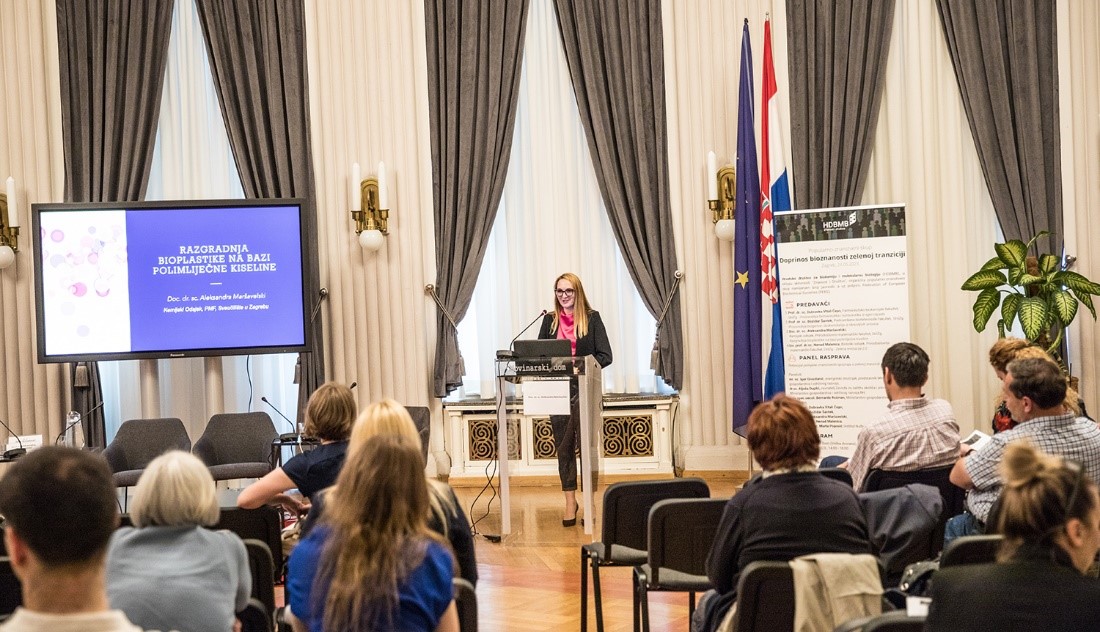
''Degradation of bioplastics based on polylactic acid"
After the presentation on the recycling of agricultural waste, the decomposition of bioplastic waste and the production of biofuel and biochemicals from renewable resources, there was a 30-minute coffee break, during which the speakers and panelists got to know each other and the other participants of the meeting, and the topics of the lecture were additionally discussed.
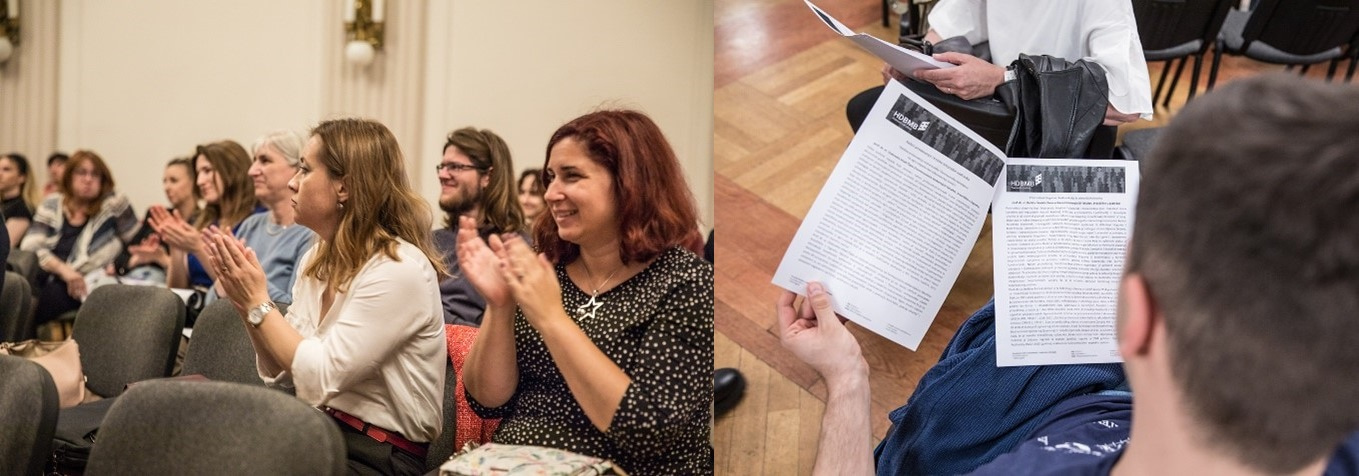
Genetic engineering technologies in agriculture
The fourth lecture was given by Assoc. Prof. Nenad Malenica from the Department of Biology, Faculty of Science, University of Zagreb, who gave an overview of the traditional and latest technologies for the application of genetic engineering in agriculture. In the face of climate change and population growth, Europe plans to gradually reduce the use of chemical protection agents in agriculture, while at the same time preserving biodiversity. In order to reach this goal, the synergy of different approaches is needed including the digitalization of agriculture, the partial elimination of synthetic pesticides and the transition to biological pest control, and the development of more resistant crops. To implement these strategies, the so-called Green Revolution 2.0, which involves the use of second-generation genetic engineering, the CRISPR-Cas system, holds great potential. This technology has changed the previous paradigm: instead of introducing foreign genes into a crop, targeted changes are made to the plant's existing genes. As a result, the USA, Japan and Great Britain do not classify plants obtained using CRISPR-Cas technology as "transgenic". This significantly reduces the cost of placing them on the market and paves the way for a wide range of innovations that should lead to more sustainable agriculture.
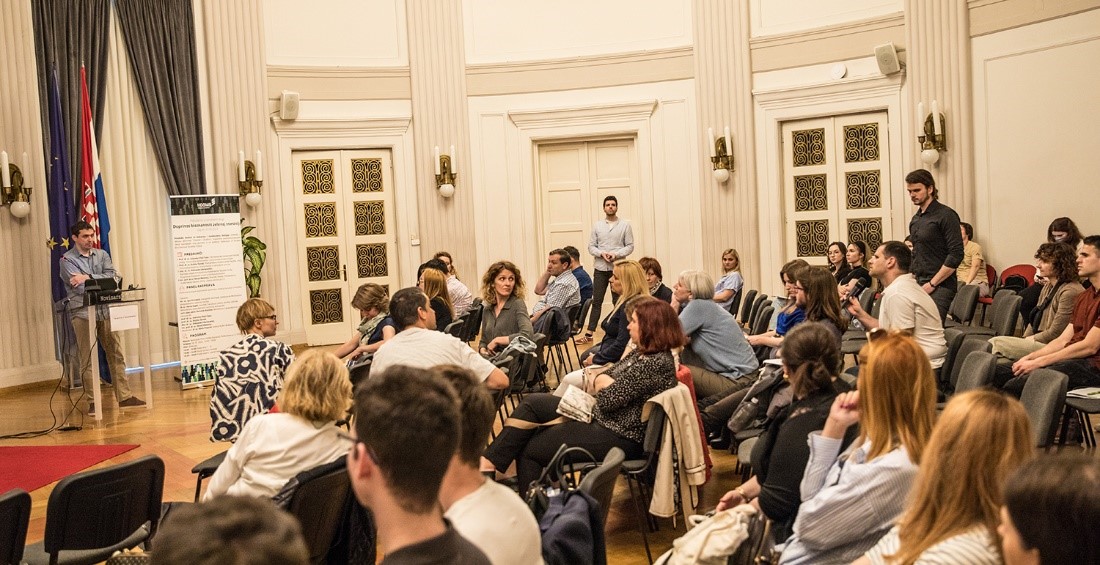
Panel discussion on the green transition in Croatia
The last lecture was followed by a panel discussion on "The potential of applying scientific knowledge in the green transition in Croatia: How to improve the link between science and society?" A 45-minute roundtable discussion included speakers and representatives of the Ministry of Economy and Sustainable Development of the Republic of Croatia: the director of the Institute for Environment and Nature Protection, Aljoša Duplić, Ph.D. and his colleague from the Climate Directorate, Bernarda Rožman, as well as Igor Grozdanić, M.Sc., an independent energy expert from the private sector. The panel discussion, moderated by Marta Popović, Ph.D. from the Ruđer Bošković Institute, was very interesting and lively. The potential of biogas and bioethanol production from renewable sources, the utilization of waste from the olive oil production, and the application of genetic engineering in Croatian agriculture were discussed. The panelists explained their views on specific problems from the perspective of the Ministry of Economy and Sustainable Development, the private sector, universities and scientific research institutes, and suggested possible solutions to improve cooperation with the academic community. The roundtable was also open to questions from the audience, which contributed greatly to the quality of the discussion.
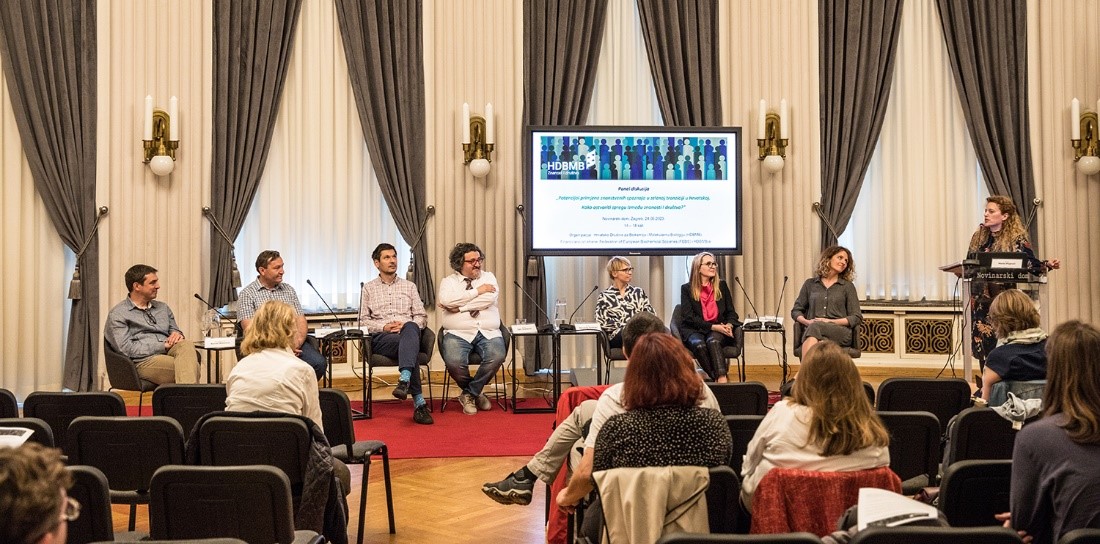
how to improve the link between science and society?"
It was concluded that biogas plants in Croatia (there are about 60 of them) are sustainable only with government incentives, provided that they have enough raw materials. Therefore, their construction should be encouraged as part of industries that generate by-products (e.g., sugar mills) that can be used to produce biogas. Plants producing bioethanol from renewable raw materials such as by-products from the processing of agricultural raw materials are not currently active in Croatia, although they have great potential for application, as they solve the problem of insufficient utilization of agricultural production surpluses, i.e., by-products from the processing of these raw materials, while at the same time obtaining renewable energy.
On the other hand, residues resulting from the cultivation of olives, wine and tomatoes in Croatia are not classified as waste at all and are currently insufficiently recycled in Croatia. It is necessary to organize their collection and find ways for their sustainable use. One of the ways to utilize agricultural waste is the production of useful biomolecules, nutraceuticals and pharmaceuticals in cooperation with the Faculty of Pharmacy and Biochemistry and the private sector. Regarding the disposal of bioplastic waste: bioplastics account for less than 5% of total plastic waste and are not currently separated from other plastics. The first step in disposing of bioplastics would be separation in a waste sorting facility, followed by enzymatic decomposition with no adverse environmental impact, if the pilot project described at the meeting proves sustainable. There was a long discussion on the panel about the potential of the CRISPR-Cas system in Croatian agriculture. While the scientific quality of this approach is sound, as is the fact that it could significantly reduce or even eliminate the use of harmful pesticides and herbicides, the path to its implementation in Croatia is unfortunately very uncertain at present. The reason for this is the lengthy procedure for approval of this concept for use in agriculture, which depends on the legal and administrative system of the Republic of Croatia. If the Croatian administration follows the example of the USA, Japan and the UK, which are already using CRISPR-Cas for sustainable agriculture, we may not have to wait a decade or two for its implementation.
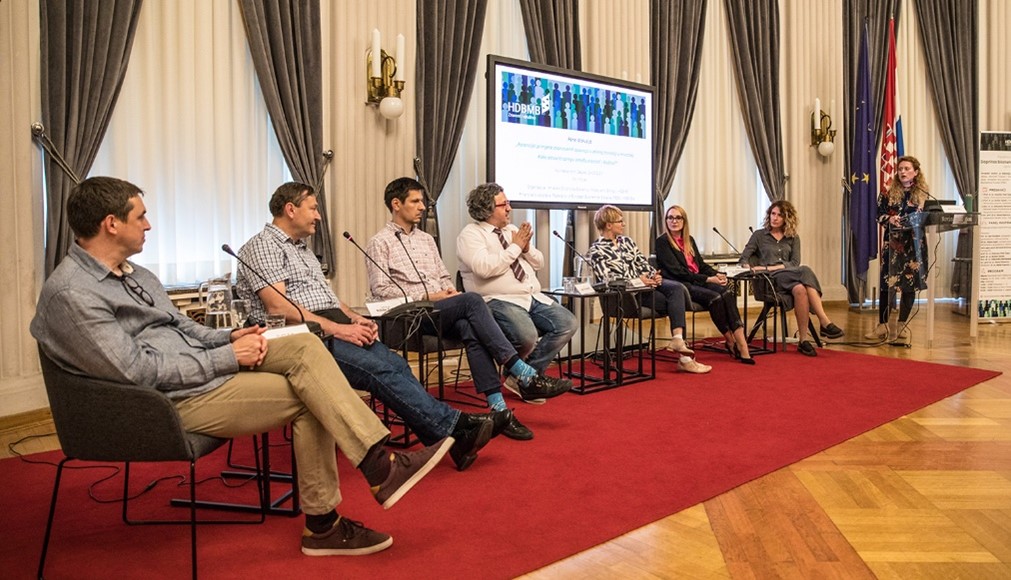
About HDBMB
The Croatian Society for Biochemistry and Molecular Biology (HDBMB), is a non-profit organization that brings together scientists and experts in biochemistry and molecular biology and related fields in the context of research, education and application. The HDBMB is a member of the Federation of European Biochemical Societies (FEBS), the International Union of Biochemistry and Molecular Biology (IUBMB), and the Croatian Society of Natural Sciences (HPD). As part of the "Science and Society" program, the HDBMB organizes popular science lectures and open panel discussions to introduce the public to the topics of molecular biosciences and their application in society at large.
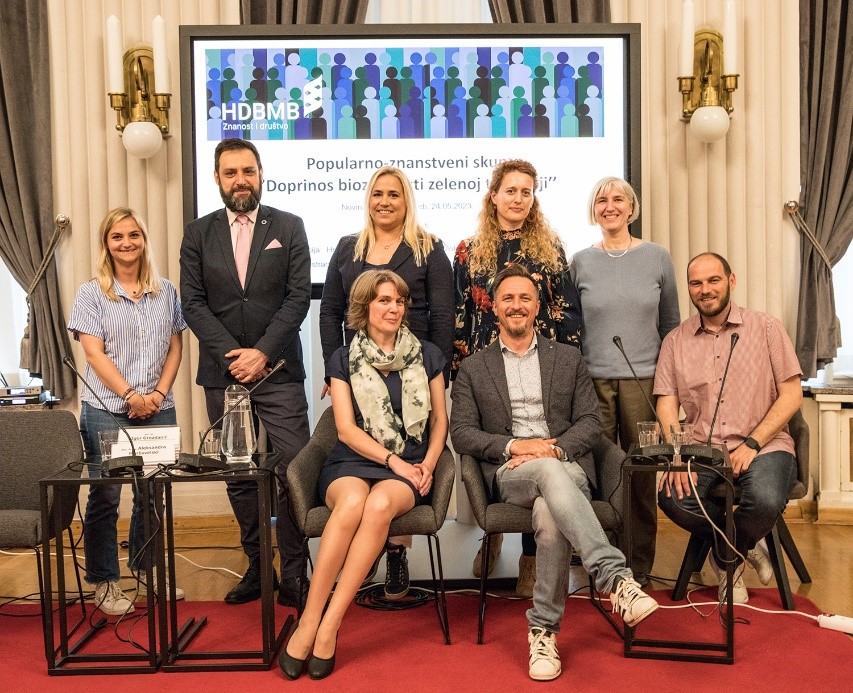
All photos by HDBMB.
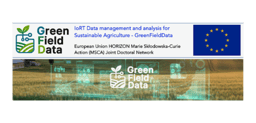

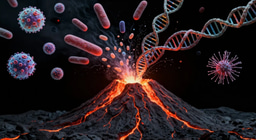


Join the FEBS Network today
Joining the FEBS Network’s molecular life sciences community enables you to access special content on the site, present your profile, 'follow' contributors, 'comment' on and 'like' content, post your own content, and set up a tailored email digest for updates.